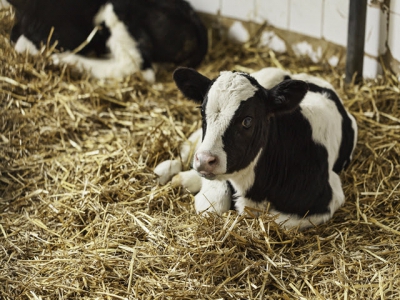Proper feeding of calves … it begins with the cow

Cow nutrition, especially in the dry period, in the last three months, seems to be of high importance for the ability of the calf to deal with pathogens, to respond properly to vaccines and to deal with feed ingredients, said Dr Hans-Joachim Schuberth from the University of Veterinary Medicine, Hannover.
He was speaking about the development of the calf immune system at the Hamlet Protein run Feed Your Brain seminar during EuroTier 2018.
Citing Ling et al, 2017, he said maternal late-gestation metabolic stress is associated with changes in immune and metabolic responses of dairy calves.
Colostrum feeding
Colostrum feeding was also a focus on his talk.
He said farmers need to take colostrum feeding as serious as possible. They need to provide early nutrition within the first hour after parturition, and provide enough - up to 4 liters, as along as the calf wants to take it up. Farmers should never restrict colostrum supply, he stressed.
“Colostrum, the calf’s first meal, has been talked about for centuries. However, in the past few years, we more and more look at things besides the well-known antibodies, the maternal antibodies delivered to the calf, we look more at other functions.
“Oligosaccharides have a big role [to play] in the maturation, in the education of the gut immune system because they serve a dual function, or even a three-way function. They lead to the generation of a healthy microbiome, they are used by microbes to grow, and they act directly on gut epithelial cells and on immune cells and favor their maturation, their growth and their interplay.”
Beyond the colostrum period
He also provided some insights into calf feeding or nutrition beyond the colostrum period and which of the different components of feed might be of greater importance.
He said both undernutrition and overnutrition decreases immune defenses in calves, and every feed constituent can affect the animal’s immune system, referencing a paper on the topic from Alwarawrah et al. 2018.
“A calf that is underfed won’t have an immune system that develops properly and you will have problems like diarrhea and other infectious diseases.”
Providing enough energy as well as giving highly digestible protein sources to the calf is critical, he said.
“It turns out that energy density is really the key.”
All forms of immunity are affected by protein-energy malnutrition, he added.
Environmental impacts
Feeding efficiency is determined by the animal’s environment from housing to management to stress, and social contact, he said.
“This is because of the so called brain to gut axis. What the brain realizes – stress, social contact, heat, - has a direct link to the gut and alters the microbiome, for instance. And if the microbiome is altered, then feed and feed ingredients are differently metabolized, differently taken up and have another action on the immune system.”
Related news
 Swapping high dietary protein levels for fermentable carbs may limit N emission in dairy co
Swapping high dietary protein levels for fermentable carbs may limit N emission in dairy co Lowering protein levels and increasing fermentable carbohydrates in concentrates fed to dairy cows on pasture may boost nitrogen use efficiency
 Heat stress has lasting effects on dairy cows
Heat stress has lasting effects on dairy cows Two years after birth, cows from heat-stressed cattle produce less milk.
 Fitness tracker for cows to help farmers
Fitness tracker for cows to help farmers New technology allows farmers to track where their cattle graze or unusual movements that could indicate theft or illness.